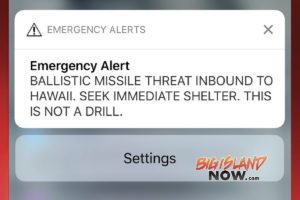Senate Passes Act to Improve Emergency Alert System
The U.S. Senate unanimously passed the Authenticating Local Emergencies and Real Threats (ALERT) Act on Tuesday, June 26, 2018.
The legislation authored by U.S. Sen. Brian Schatz was introduced following the false emergency alert that went out across Hawai‘i on Jan. 13. The act intends to improve the emergency alert system and give the federal government the primary responsibility of alerting the public of a missile threat.
“The people who know first should be the people who tell the rest of us,” said Sen. Schatz. “This legislation makes it clear that the authority to send missile alerts rests with the federal government. I look forward to seeing this bill go on to the next step needed to become law.”
State and local governments have been largely responsible for alerting the public of threats from natural disasters and severe weather. With various government agencies issuing alerts, the system has relied on an inconsistent patchwork of technologies and procedures established by each agency. The false alarm in Hawai‘i highlighted some of the weaknesses in the state’s emergency alert system, which had a poorly designed user interface and did not have a sufficient verification system or computer redundancies to help prevent mistakes. The incident made clear the need for federal standards in the system and called into question the state’s responsibility to issue a missile alert.
The Schatz legislation would strengthen the way state and local governments use the Integrated Public Alert and Warning System, the FEMA platform used by emergency management professionals across the country to issue warnings. Original cosponsors of the ALERT Act include U.S. Sens. Kamala Harris (D-Calif.), Cory Gardner (R-Colo.), Dan Sullivan (R-Alaska) and Mazie K. Hirono (D-Hawai‘i).
The bill now heads to the U.S. House of Representatives for consideration.







